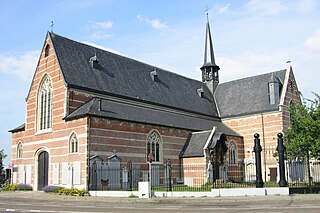Saint Carthage the Elder was an Irish bishop and abbot in the sixth century. His feast day is 5 March.
Fiachna or Fiachnae is a name borne by several figures from Irish history and legend, including:

Saint Féchín or Féichín, also known as Mo-Ecca, was a 7th-century Irish saint, chiefly remembered as the founder of the monastery at Fore (Fobar), County Westmeath.
Saint Psalmodius, also known as Psalmet, Sauman, Saumay, was a 7th-century Christian hermit. Assumed to have been born to a noble family of Scotia, he became a disciple of Saint Brendan as a young boy. Psalmodius, whose original Celtic name is unknown, is said to have been lost at sea for three days as a young boy.
Saint Chuniald was an early Irish priest and missionary who worked for many years in Germany. He lived in the 7th century.
Erlulph was a Scottish missionary and 10th Bishop of Verden who was martyred by pagans in Germany. His feast day is 10 February.
Saint Damhnade was an Irish virgin who was known for working miracles. She is sometimes confused with Saint Dymphna. Her feast day is 13 June. Very little else is known of her.
Saint Fiodhairle Ua Suanaigh was an Irish abbot who was considered to be a saint. His feast day is 1 October.

Saint Werenfried was an English Benedictine monk, priest and missionary among the Frisians. His intercession is thought to relieve the pain of arthritis and to help gardeners. His feast day is 14 August.
Saint Bécán was an Irish monk who founded a monastery at Kilbeggan and is considered by some to be one of the Twelve Apostles of Ireland. His feast day is 5 April.

Saint Fredigand of Deurne was an 8th-century Irish missionary in the territory around Antwerp in what is now Belgium. His feast day is 17 July.
Saint Dotto was said to have founded a monastery on one of the Orkney Islands, which bore his name. However, there is no island by that name, and no evidence that he existed. His feast day is 9 April.
Saint Wasnulf was a Scottish missionary in what is now Belgium. His feast day is 1 October.
Saint Joavan was an Irish priest and bishop in Brittany.

Saint Babolen was Abbot of Saint-Maur-des-Fossés Abbey near Paris. He may have been Scottish in origin. His feast day is 26 June.
Saint Tochumra was a holy virgin, or possibly two virgins, in medieval Ireland. Her feast day is 11 June.
Saint Maccai was an Irish missionary who founded a monastery on the Isle of Bute, Scotland. His feast day is 11 April.
Saint Augulus was a 3rd or 4th century bishop and martyr in a town called Augusta in Britain, or perhaps in Normandy. He was possibly Irish in origin. Little is known about him, but his feast day is given as 7 February.

Saint Munde was a Scottish abbot in Argyll, Scotland. There is some confusion between this saint and the much earlier Saint Fintan Munnu. His feast day is 15 April.

Saint Syra of Troyes was an Irish woman, sister of Saint Fiacre, who became a nun in France and died in Meaux but came to be venerated in Troyes. Her story has been conflated with that of a woman named Syria who died in Troyes in the 4th or 5th century. Her feast day is 8 June.